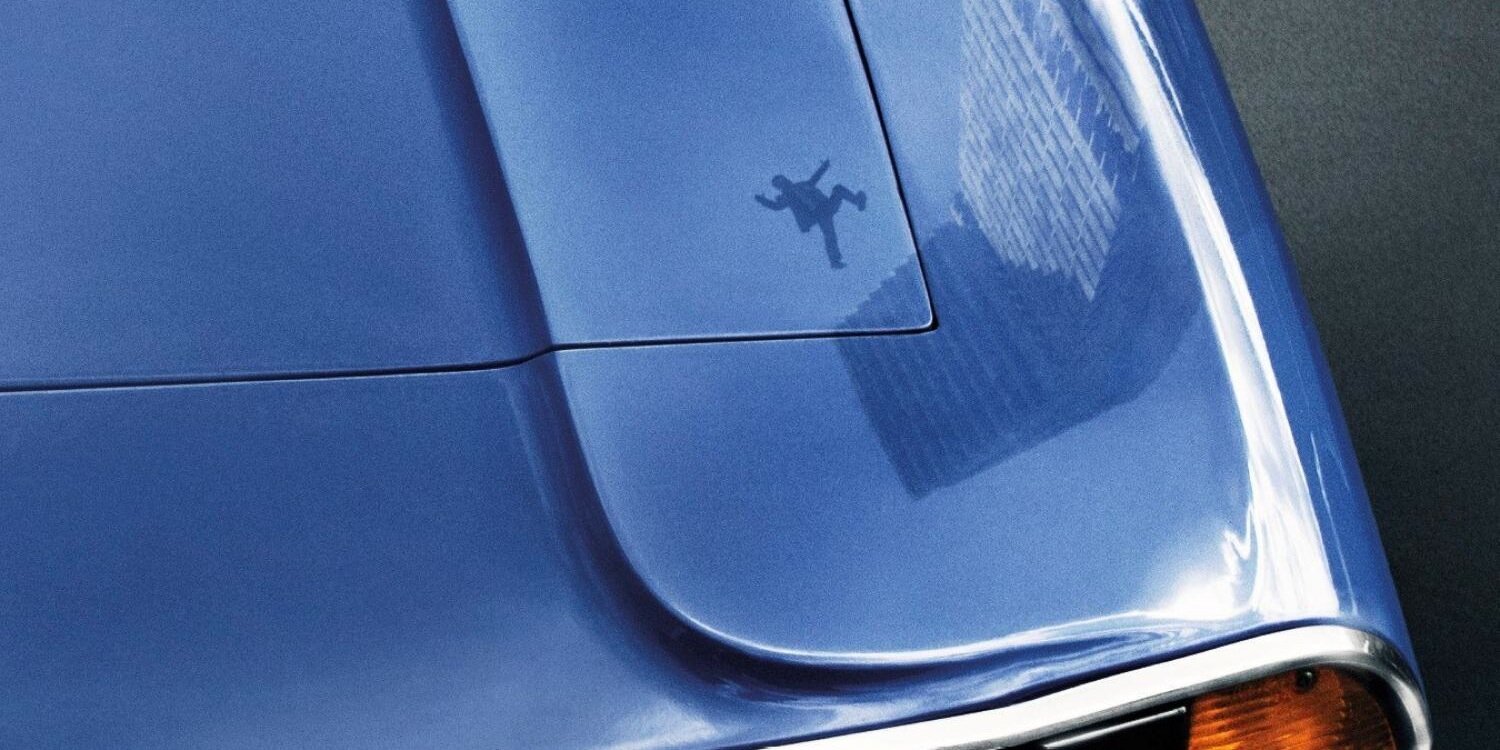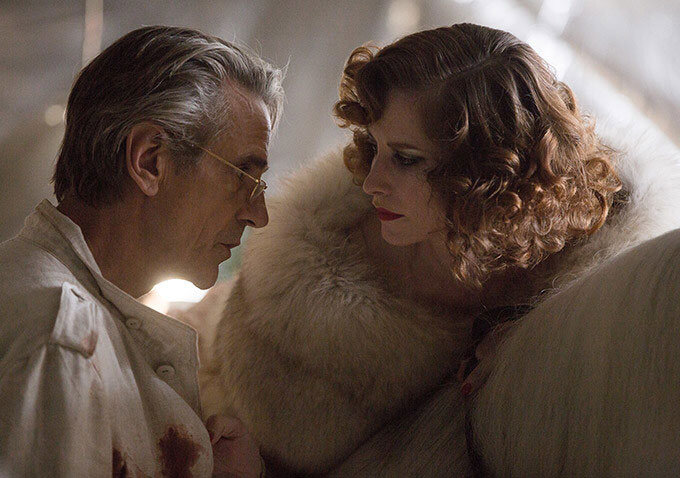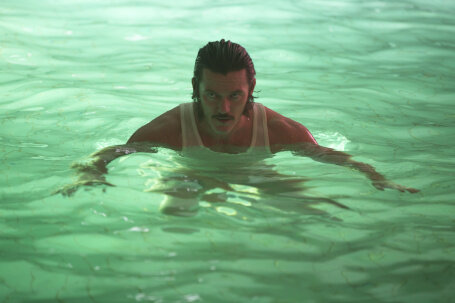Decadence On The 30th Floor - High Rise (2015)
Based on the book of the same name by JG Ballard, High-Rise is a project long in the making, finally brought to our screens by Ben Wheatley. This is easily the biggest project of Wheatley's career so far: the director behind Kill List, Sightseers and A Field In England, Wheatley has finally gotten his teeth into a much larger project (cast, budget, content, you name it.) He brought High-Rise to the ADIFF (Audi Dublin International Film Festival, for the uninitiated) and appeared for a Q&A after the screening.
Yes, I asked a question.
Yes, I got a T-shirt.
And yes, it is glorious, movie and T-shirt alike.I have a dirty confession to make before things get interesting: I haven't actually read High-Rise, so my viewing of this film was entirely on its own merit. That's not to say I haven't wanted to read it, but there are only so many books you can read and write before you lose the ability to do either.
I'm getting back into some old habits here.
That said, I knew what to expect from this film, a pseudo-dystopian look at the world of the baby-boomers, the growth of the 70s high-rise apartment block and the decadence and decay that came along with those close-quarters. Because this is a work with it's origins in the 70s, and I've seen enough 70s movies and read enough 70s books to know a dystopia when I see it.
Something is clearly wrong from the beginning of this film as Tom Hiddleston's Dr. Robert Laing sits on his apartment's balcony, roasting some unidentifiable meat on a spit (okay, it's probably the leg of a domesticated animal.) Laing speaks about himself in the third person, dressed conservatively in his shirt and tie mixed with his sports shoes and shorts. He helps a neighbour with the garbage shoot before we skip back in time a couple of weeks (yep, it's only been weeks) to show Laing's arrival to move into the high-rise. (For reference, the neightbour here is Reece Shearsmith, best known as part of The League Of Gentlemen. That should give you some idea of the tone and themes at play here.)
The building is full of all the mod-cons, things with just an air of futurism like an in-house supermarket, several swimming pools and lifts that don't always work. Laing is comfortable enough in his closed quarters to sunbathe naked on the balcony, but that proximity is made uncomfortable when his upstair neighbour Charlotte (Sienna Miller) espies him from her own balcony.
Yep, that's it. We're five minutes in and we have a naked man being looked down upon from above. You're getting the subtext here, right?
It's quickly established that the high rise of the title is a thinly veiled social structure of its own: the lower your floor, the lower you are in the building's pecking order. Laing and Charlotte are lucky with their apartments in the 20s, comfortably capable of dealing with lower and upper levels in the same breath. The lower-levels are represented by the Wilder family, pregnant Helen (played by Elisabeth Moss) and her husband, TV camera-man Richard (Luke Evans) while the upper levels can go no higher, than the owner and designer of the high-rise and it's sister buildings, Anthony Royal (Jeremy Irons.)
Again, check the names of those characters: wouldn't it be crazy foretelling if the lower classes were to go wild, rebelling against the royalty at the top of the building?
Socially, the high-rise is at an uncomfortable detente, with the lower levels prone to regular failures in service while the higher levels party. Like, they literally eat cake while dressed in the attire of the French court in a party that Laing is simultaneously invited to and told he is anything but welcome. As the high-rise's facilities are slowly impeded (electricity, private parties blocking access to the pools and a lack of wine at the supermarket) tensions rise ever-higher between the building's inhabitants. Whole levels indulge in orgiastic behaviour in the candle-light and short tempers lead to riots for some and death for others.
Through all of this, the high-rise's civil facade is slowly chipped away, and Wheatley uses different imagery and vignettes to highlight this, varying from the oblique to the most brutal and on-the-nose. These moments dance with an air of brutal comedy, with characters delivering monologues while receiving felatio at the centre of a literal orgy while others are so obsessed with reaching the heights of the upper floors that they begin communicating in only French.
Another French reference? While society is crumbling apart? And people are eating cake? Is that subtext I smell?
With Laing trapped at the centre of all this madness, it's little wonder that his own mental state begins to dwindle. He remains the literal middle (levels) man, but he is not immune to the madness and the film continues to remind us of the man we were shown at the opening scenes, a man who has been so corrupted by the high-rise that he doesn't go to work. Laing does little other than continuing to work out in the gym.
At least it's not an electric rowing machine in the gym. That probably wouldn't work, right?
The orgy of sex and violence reaches its head (sorry) with Wilder starting a journey to the top floors and the reclusive Royal moving all the way downstairs to the front doors.
High-Rise rarely steps away from its heart, a brutally farcical look at class in an urban environment that isn't too far removed from the world we live in. The film's social commentary touches on every class, from women to the media, casting just a quick glance at each. The farcical whims of the movie and its narrative might draw laughter from a certain audience, but it hammers its points home with every chance it gets.
High-Rise isn't a film to everyone's tastes: during the Q&A afterwards, Wheatley discussed that very fact, and some of the audience's questions were clear, with some wanting more of the dark comedy of Sightseers while others wanted the unease of Kill List. Instead, High-Rise brings together Wheatley's body of work with a subtle blend of traditional and dark comedy, violence, sex and social commentary, all in a surprisingly neat package. In fact, High-Rise is so dense and tightly edited that its two hour running time feels somewhat longer, with the film taking a sprawling storied structure with highs and lows reminiscent of Cloud Atlas (and I mean that as a compliment.)
Wheatley also made specific reference to Amy Jump, his collaborator on several films and writer of this: he drew attention to the fact that her work on this film is so important that she is credited alongside him in the opening credits. With each question, Wheatley made Jump's place in the creation of this film more and more important, and it was a warming comment to hear a director respecting his writer and co-editor in such a fashion, proving that the two of them are an amazing, powerful force.
As Laing, Hiddleston is surprisingly commanding: while he certainly has acting chops, his camp performances in the various Marvel films and Crimson Peak left me shrugging, certain that all the attention towards his performances was blinded by the gloss, budget and names for those roles. Not so here: Hiddleston's performance turns on a dime, drifting between cold and comedy in keeping with the much larger themes of the film.
The rest of the cast follow his lead, each doing what's required from them at any given moment: Sienna Miller courts ground of a Bond-girl who is at once in command of and subject to her past and her sexuality while Luke Evans is full of Welsh sound and fury in a role that doesn't ask for anything more than to bray obnoxiously.
My one issue with High-Rise is, ironically, the entire point of the film, and it plays this card several times: there are so many supporting characters (women with big hair and men with moustaches) that it becomes nearly impossible to tell them apart. The film flirts with this conceit during moments of darkness, during that French aristocratic party where it is impossible to tell them apart amongst the pomp and hair.
You know, just like it's impossible to tell the different floors of an apartment building apart?
On this first viewing of High-Rise, the film has the words "cinematic masterpiece" all over it, but one that you will either love or hate (I did see it at a film festival after all.) It's one I've written about at length right here and now, and all while barely skimming the surface.
I'll watch this again. I might enjoy it even more. I might even write even more about it. That's the type of film this is.
It's called High-Rise and like its name, it's a lofting tower of an achievement.




